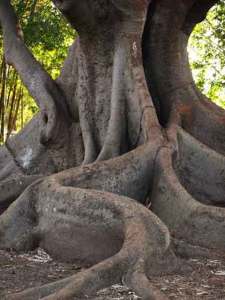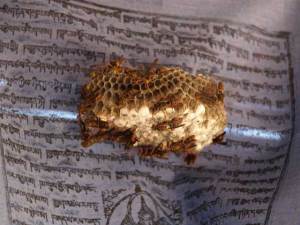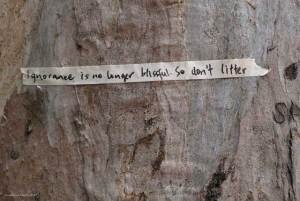You are currently browsing the category archive for the ‘Uncategorized’ category.
- Australia is country of 70% desert.
- We are the third highest user of water in the world after the USA and Canada.
- Each Australian household spends up to $1500 on energy bills and creates approximately 7 tonnes of CO2 every year through electricity consumption, equivalent to the emissions of 2 cars.[1]
- The national average for greenhouse pollution is 27 tonnes per person per year and households create 1.14 tonnes of waste per year.[2]
- Most waste ends up as landfill or as litter spoiling our environment.
- Australians own more cars per capita than every other country except USA.[3]
With these statistics, it is clear we need to take responsibility as individuals and not wait until government regulation forces our involvement and co-operation.

This Fig was planted in 1848 in Newtown, Sydney - its roots reach to my waist & I'm average height
This web-site offers a range of simple strategies to help you save energy and reduce your production of greenhouse pollution. These strategies will also save you money and, importantly, will not impact significantly on your standard of living. Many can be implemented immediately. Some require time and money. If you are not used to thinking in terms of your impact on the environment, you may want to ease in gently by doing some things before moving on to others. However, the world is in a precarious situation and worsening every day, so it is in humanity’s best interest to make as many changes as you can.
If we all ignore what is happening regarding climate change, we may find ourselves in a position where life is uncertain, where people and other sentient beings are dying from storms, floods, fires, heat and where new diseases become commonplace. We know that many insects and animals have become extinct and many others are joining the endangered list at a rapid rate. We know our weather is changing. We know that millions and millions of people are subjected to food and water shortages. We know there is gross inequity in the world where some have little and others have a plethora of choice. We know that the world is coming dangerously close to over-population and some experts would say we have already passed that point. We know that new diseases are on the increase and there are super-bugs resistant to antibiotics. We know that asthma, diabetes and heart disease are increasing. We know that the past one hundred years or so have been about excess and that the great technological advancement has costs to our environment and the Earth’s resources. We know we are leaving all this to our children and their children. As Buddhists, we believe in rebirth and, as such, will have to come back to the world we are making now. For most of us, death will not release us from the effects of our choices. If we keep going at the current rate of destruction, it will be a very unpleasant world and one fraught with difficulties just to survive.

These wasps decided that our Prayer Flags made a good home. May it be the cause for their enlightenment!
As Buddhists we do not believe there is a higher power watching what we do, punishing and rewarding us accordingly. We believe we make our own future by creating our own karma, which can be positive or negative. We also believe in the validity and the extraordinary benefits of accumulating merit. Therefore, it is appropriate to mention that every time we make a conscious choice to do something that is beneficial to the environment and other sentient beings, including animals and insects and we dedicate that action for the benefit of all sentient beings, we earn merit. Every time we make a conscious choice to not do anything that is harmful to the environment, we earn merit. Every time we choose not to kill an insect or an animal, we earn merit. The amount of merit increases if our choices are made specifically with the motivation that what we are doing and the choices we are making are for the benefit of all sentient beings, even if this is sometimes inconvenient. Therefore, we can accumulate vast amounts of merit every day just by choosing to do simple things that are environmentally friendly and non-harmful. In this way, our practice reaches further than the meditation cushion and mere aspiration and becomes holistic.
Additionally, we have an opportunity to teach our children how to live in an environmentally friendly way with every choice we make and with everything we do. Our choices will also set an example to those around us, allowing us to quietly educate about other options. It may be as simple as taking our own mug to a meeting or as far ranging as installing solar panels and water collection tanks on our property.

I saw this piece of tape on a tree in a park in Southern Sydney. It reads - Ignorance is no longer bliss so don’t litter.
About 2001 I was given a copy of the following, which had a great impact on me.
If we could turn the population of the earth into a small community of 100 people, keeping the same proportions as we have today, it should be something like this: [4]
- · 61 Asians
- · 12 Europeans
- · 14 Americans (from North and South America)
- · 13 Africans
- · 1 Australian
- · 50 men
- · 50 women
- · 10 are homosexual
- · 33 are Christians
- · 18 are Muslim
- · 16 are Hindu
- · 16 are non-religious
- · 6 are Buddhists
- · 11 practice other religions
- · 41 live without basic sanitation
- · 16 live without an improved water source
- · 6 people own 59% of the entire wealth of the community
- · 13 are hungry or malnourished
- · 14 can’t read
- · only 7 are educated to a secondary level
- · only 8 have a computer
- · only 4 have an internet connection
- · 1 adult has HIV/AIDS
Of the community’s total annual expenditure of just over US $3,000,000 per year:
- · $181,000 is spent on weapons and warfare
- · $159 is spent on education
- · $132,000 is spent on health care
- · 25 struggle to live on less than US $1 per day
- · 47 struggle to live on US $2 per day
If you keep your food in a refrigerator, your clothes in a closet, have a roof over your head and have a bed to sleep in, you are richer than 75% of the entire population. If you have a bank account, you are one of the 30 wealthiest people in the world.
I hope these pages will inspire you to incorporate positive environmental changes into your lifestyle and enhance your Buddhist practice of mindfulness, generosity, personal responsibility and consideration for all sentient beings. I welcome any suggestions and techniques for saving energy and lowering our impact on the environment, so please write in ‘comments’ with your ideas. These pages will grow as my knowledge increases. I want these pages to be useful and to have a Buddhist approach in dealing with these issues.
NOTE: At this stage I plan for this home-page to be static. I will be updating the individual pages as I learn more so it is those pages which will change.
[1] Energy Australia
[2] Conservation Foundation of Australia
[3] Conservation Foundation of Australia
[4] The Miniature Earth Project: I was unaware of the source until doing research for this article. I found the original version written by Donella H. Meadows, Adjunct Professor of Environmental Studies at Dartmouth College, USA. Hers was written in 1990 and contains more details. See Resources for the link to read the original. I decided to stay with the copy I have because it is smaller and seems more relevant to today’s statistics.
Welcome to WordPress.com. This is your first post. Edit or delete it and start blogging!

Recent Comments